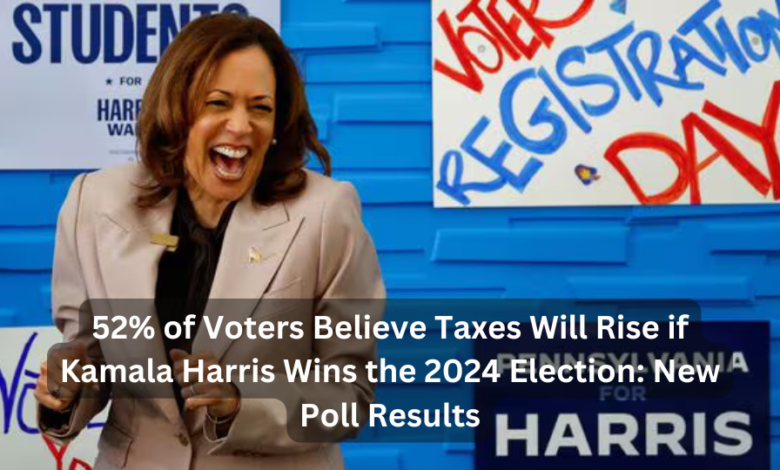
As the 2024 U.S. presidential election approaches, a recent Rasmussen Reports poll sheds light on voter sentiment regarding the potential impact of Vice President Kamala Harris’ tax policies. According to the poll, a significant portion of likely voters believes that Harris is more likely to raise taxes if she wins the election against former President Donald Trump. The issue of taxation has taken center stage, with 52% of respondents indicating that they expect higher taxes under a Harris administration.
This article delves into the poll’s findings, exploring how voter expectations on tax policies vary across political, demographic, and gender lines. It also touches on how tax policy will be a key issue in the upcoming election.
Voter Expectations on Harris’ Tax Policies
According to the Rasmussen poll, when voters were asked whether Kamala Harris would be more likely to raise or lower taxes if she wins the election, the majority of respondents expressed skepticism about potential tax cuts. Specifically, 52% of likely voters said Harris would raise taxes, while only 25% believed she would lower them. An additional 17% suggested that Harris might keep tax levels roughly the same, and 5% remained unsure.
The poll highlights significant differences in tax expectations between various groups of voters, particularly along partisan lines, with Republicans, Democrats, and independents showing contrasting views.
Republican and Independent Voter Sentiment
Republicans overwhelmingly anticipate that a Harris presidency would lead to higher taxes. 76% of Republican voters expressed the belief that Harris would increase taxes if elected. Similarly, 60% of independent voters, or those unaffiliated with either major party, agreed with this sentiment.
This widespread expectation among Republicans and independents reflects concerns about Democratic tax policy, which they perceive as generally leaning toward higher taxation, especially on wealthier individuals and corporations.
Democratic Voters’ Perspective
Interestingly, Democratic voters’ views diverged sharply from their Republican and independent counterparts. Only 23% of Democrats said they believed Harris would raise taxes if she wins. In fact, 44% of Democrats predicted that Harris would lower taxes, a stark contrast to the opinions held by members of other political groups.
This split within the electorate suggests that tax policy will remain a contentious and polarizing issue in the 2024 election.
Tax Concerns Among Different Demographic Groups
Aside from partisan differences, the poll also explored how expectations of Harris’ tax policies varied based on gender, age, and race.
Gender Discrepancies in Expectations
The poll showed notable differences between male and female voters on the topic of potential tax increases. 61% of men indicated they believed Harris would raise taxes, while only 45% of women shared this concern. This gender gap highlights how men may be more attuned to, or concerned about, the economic policies proposed by the candidates.
Age Group Analysis
Across different age groups, voters over the age of 65 were the most likely to expect a tax hike under Harris. 60% of voters aged 65 and older expressed this belief, compared to 53% of voters aged 40-64 and 45% of voters under 40. This data suggests that older voters are more focused on fiscal policy and the potential for increased taxes.
Racial Breakdown
The poll’s racial breakdown revealed some interesting trends regarding the importance of tax policy. Among those who said taxes will be a “very important” issue in the election, 65% believed Harris would raise taxes if elected. When broken down by race, 51% of white voters, 56% of Black voters, 49% of Hispanic voters, and 48% of other minority groups indicated that they consider taxes a key issue in this election.
Interestingly, Black voters were the least likely to believe Harris would raise taxes compared to other racial groups, reflecting a potentially more favorable view of the Democratic nominee’s approach to taxation.
The Importance of Taxes in the 2024 Presidential Election
While many voters expressed concerns about Harris’ potential tax policies, one point of agreement across party lines is the overall importance of the issue. When asked, 85% of respondents said that taxes will play a significant role in the 2024 presidential election. 51% of these respondents went so far as to say that taxes will be a very important issue in determining their vote.
This sentiment was shared almost equally across the political spectrum. 85% of Democrats, 84% of Republicans, and 88% of independent voters all indicated that taxes will be at least somewhat important in the election. This widespread agreement reflects the high stakes attached to economic policy in an election marked by post-pandemic economic challenges and budget debates.
Men vs. Women on Tax Importance
In terms of gender, men and women seemed equally aligned on the importance of taxes, with the majority in both groups ranking the issue as a top concern. However, men were again more likely than women to expect a tax hike under a Harris presidency, showing a broader divergence in outlooks on potential economic policies.
Harris vs. Trump on Tax Policy
Both Kamala Harris and Donald Trump have begun to outline their respective tax agendas as part of their broader economic platforms for the 2024 election.
Trump’s Promises on Tax Cuts
Former President Trump has made bold promises regarding tax reform. Recently, Trump announced plans to eliminate taxes on overtime pay, as well as taxes on Social Security benefits and tips. These proposals align with Trump’s previous tax-cutting policies from his 2017 tax overhaul, which aimed to reduce taxes across income brackets, though critics argued that the changes disproportionately benefited wealthy individuals and corporations.
Harris’ Tax Stance
Vice President Harris has not unveiled a comprehensive tax plan for the 2024 election yet. However, her statements suggest a more moderate approach, focused on maintaining progressive taxation, while still appealing to middle-income voters. Interestingly, Harris echoed Trump’s proposal to eliminate taxes on Social Security benefits, potentially signaling an effort to appeal to older voters, a group that expressed concern about taxes in the Rasmussen poll.
Nonetheless, Harris’ overall alignment with traditional Democratic tax policies, which tend to favor tax increases for high-income individuals and corporations, remains a key source of voter concern, especially among Republicans and independents.
Conclusion
As the 2024 election heats up, the Rasmussen Reports poll highlights the significant role that tax policy will play in shaping voter preferences. With 52% of voters expecting Vice President Kamala Harris to raise taxes if she wins, it is clear that concerns over fiscal policy will be front and center during this election season.
The divide between Republican, Democratic, and independent voters shows how polarized the electorate is when it comes to the potential economic direction of the country. Furthermore, demographic factors such as age, gender, and race contribute to the complexity of voter expectations, illustrating the nuanced concerns that candidates must address.
Whether Harris’ tax policies will prove to be more moderate than expected, or whether Trump’s tax-cutting proposals will sway voters, remains to be seen. However, one thing is certain—taxes will be a critical issue for voters as they head to the polls in November 2024.




